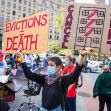In an effort to keep tenants who are struggling to pay their rent in their homes during the pandemic, Governor Cuomo signed the COVID-19 Emergency Eviction and Foreclosure Prevention Act earlier this week. This new eviction moratorium comes on the heels of several federal and state eviction moratoriums that are set to expire at the close of the year.
According to the Governor, the new COVID -19 Emergency Eviction and Foreclosure Prevention Act will offer protections for both tenants and landlords. There will be a statewide ban on all evictions for the first 60 days, as well as evictions that are currently pending. After the first 60 days, tenants will need to file paperwork showing that they cannot pay their rent due to a hardship caused by the pandemic in order to have their eviction suspended.
In a statement released by the Governor's office, Governor Cuomo explains, "This law adds to previous executive orders by protecting the needy and vulnerable who, through no fault of their own, face eviction during an incredibly difficult period for New York. The more support we provide for tenants, mortgagors, and seniors, the easier it will be for them to get back on their feet when the pandemic ends.”
What Does the COVID-19 Emergency Eviction and Foreclosure Prevention Act Entail?
This new and more expansive act will cover tenants, landlords, and seniors in various ways and is a bit more comprehensive than previous eviction moratoriums.
With regards to tenants, this extended moratorium will protect tenants for an additional four months but will expire on May 1st of the new year. The moratorium will only cover tenants if they cannot pay their rent because of COVID-19 related hardships. There will be a new hardship declaration form that affected tenants will need to fill out. Reasons extending beyond hardships resulting from the pandemic will not be covered, giving landlords the green light to proceed with evictions in cases of breach of contract and other safety hazard issues.
Landlords will also be protected to a degree for the same duration because there will be a moratorium on foreclosure proceedings on the property. Only landlords who own ten or fewer properties will be protected under the moratorium. Landlords will also have to prove their delinquency is related to the pandemic by filling out a hardship declaration form.
Additionally, local governments will be prohibited from initiating a tax lien sale or tax foreclosure, and negative credit reporting will not be permitted. Local governments will also need to carry over Senior Citizens' Homeowner Exemption (SCHE) and Disabled Homeowner Exemption (DHE) from the previous year to 2021 at the same levels.
Landlords Push Back on Eviction Moratorium Extension
While this new eviction moratorium provides greater protection for tenants as we enter the new year, not all landlords are in support of the moratorium extension.
A New York real estate publication, The Real Deal, argues that the protections offered to landlords will be of very little benefit, especially to small mom-and-pop landlords who are being targeted as beneficiaries of the eviction moratorium.
In response to a similar piece of legislation that was sponsored by Senator Zellnor Myrie in which the senator urges for stricter restriction on evictions up to a year after the pandemic ends, a slew of landlords and landlord associations argue that the eviction moratoriums are temporary band-aids. Furthermore, the moratoriums disregard hardships that landlords, particularly small-scale landlords, have to deal with.
Several groups, including Small Property Owners of New York, New York Landlords, the New York Capital Region Apartment Association, the Under One Roof coalition, Property Owners Association of Greater New York and the New York Chinese Property Owners Alliance took part in an open letter that was drafted by the Coalition of New York State housing providers. In this open letter, the groups advocated that bills that put a blanket ban on eviction will only further harm the property owners.
The Rent Stabilization Association has come out in support of the open letter with President Joseph Stroudsburg explaining that a blanket moratorium such as senator Myrie’s and by extension Governor Cuomo's, “created an environment in which tenants are taking advantage not paying the rent even when they have the means to do so.”
In response to such criticism, Democratic Senator Brian Kavanagh explains that any tenant who lies about their inability to pay their rent will be faced with a misdemeanor offense under the new moratorium. Senator Kavanagh goes on to explain that verifying whether or not tenants are purposefully defaulting on payment would not be feasible to investigate during a pandemic.
The president of the Real Estate Board of New York, James Whelan, shares this sentiment stating that “creating a broad incentive for any tenant to refuse rent would place even greater strain on New York’s ailing economy and further deplete the tax revenue that fuels basic government services for our entire population.”
Recent estimates suggest that nationwide, renters owe about $70 billion in back taxes. Landlord groups express their concern that while eviction moratoriums may seem beneficial, they could potentially cause more harm than good as tenants will be drowning in back rent that will inevitably be difficult to pay off.
National Response to the Rent Crisis
With the passage of the federal COVID -19 Relief bill, $25 billion has been allocated for rental assistance. This federal legislation could mean that although eviction moratoriums will remain in place, landlords may start to see rental payments trickle in. Diane Yentel, the president and CEO of the National Low Income Housing Coalition (NLIHC), explains, “While extending the CDC eviction moratorium for one month is insufficient to keep people housed for the duration of the pandemic, the extension provides essential and immediate protection for millions of renters on the verge of losing their homes in January.”
There is a conflicting analysis of how much money is actually needed to help tenants pay for rental assistance. While the bill only provides $25 billion, some groups including NLIHC suggest that at least $100 billion is required to truly help both tenants and landlords.






